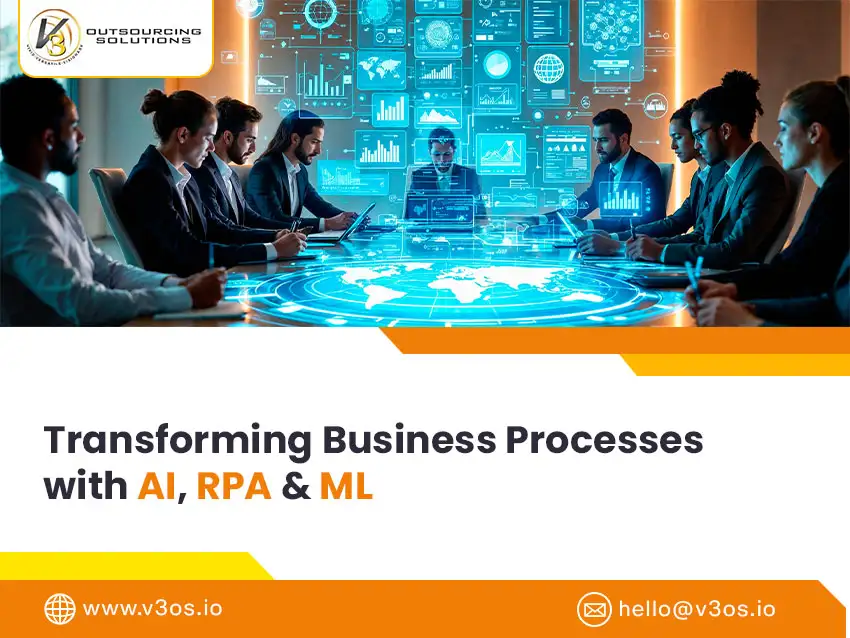
To match the speed of the fast-paced digital world, businesses have to switch to advanced tools and technologies that can actually transform the entire back office system. The integration of disruptive technologies like artificial intelligence (AI), robotic process automation (RPA), and machine learning (ML) can prove a milestone. These revolutionary technologies are capable of increasing efficiency at a way lower cost. With digital transformation, businesses are winning a competitive edge.
Certainly, the corporate world is shifting to independently running business operations, which are actually smarter, more scalable, and more adaptive to the transformation. Let’s introduce you to the most trending advanced technologies that are enabling digital transformation.
AI has evolved to replicate human intelligence. It has evolved to facilitate faster and smarter decisions. The technology is made intelligent to understand intent, navigate language barriers, recognise unique patterns and adapt to changes without the need for explicit programming.
RPA is a software or bot that is programmed to simulate human action, such as data entry, billing processing, and automatically responding to common customer queries. This technology typically follows protocols to offer resolutions for repetitive tasks in a comprehensive format.
Machine learning is a subsidiary of AI that is powered by data models to test and drive insightful algorithms. These algorithms frequently evolve themselves to improve their versions. Simply put, it enables automated systems to predict and adapt accordingly. This capacity makes them way more intelligent and less reliant on traditional rules.
The aforesaid technologies integrate substantial value by streamlining workflows with BPM solutions. The existing systems get better & digitally transformed. These technologies enhance the scope of automation, allowing it to easily shift from handling simple repetitive tasks to managing complex and cognitive processes. Let’s discover the transformation these technologies drive, automating processes.
Considering the data based personal tasks like data entry and copy pasting from one system to other is like a walkover with traditional RPA. When it is used in tandem with AI & ML, RPA can easily achieve the tasks.
Let’s think about the portion of email processing, showing how the amalgamation digitally automates back office tasks. This great fusion initiates extracting email data, understanding intent and responding likewise without any human interference.
Business from industries including insurance, banking, healthcare, etc., provides a large volume of unstructured data in the form of PDFs, emails, forms, etc. However, RPA can incorporate repeated entries efficiently. However with optical character recognition, OCR & machine learning models the tasks become way easier.
The combination of machine learning and artificial intelligence lets organisations select cognitive automation over traditional rule-based automation. Such technologies let:
These days modern automation is making the survival of humans more difficult & challenging. However, the aforementioned technologies have emerged to maximise human capabilities manifold. Such advancements result in:
Real-World Applications
Digital transformation of business reveals a revolution in industries which can be witnessed in the cases of the finance, retail & healthcare industries.
Advantages of Converged Automation:
It is through automated technologies that advanced digital systems elevate their benefits:
The very first benefit is to marginalise human-created errors via AI & ML. In relation, the back office tasks are performed with greater efficiency.
The next benefit is related to future-proofing. Bots can scale up or down quickly their capacity without the need for human-based resources.
The introduction of automated systems highlight useless and obsolete roles, helping in reducing overhead costs.
The comparison of humans with technologies highlights faster resolutions, personalised interactions and 24/7 support, improving satisfaction.
Organisations become more agile and are able to respond quickly to market shifts, making use of the real-time analytics and adaptive workflows with minimal bottlenecks.
The digital transformation of business processes can be simply executed by leveraging technologies like AI, RPA, and ML. These are able to introduce a business revolution, which automates not only back-office systems but the entire workflow. These technologies streamline everything, which enhances overall operational efficiency, driving innovation. Count on V3OS to get the best results.